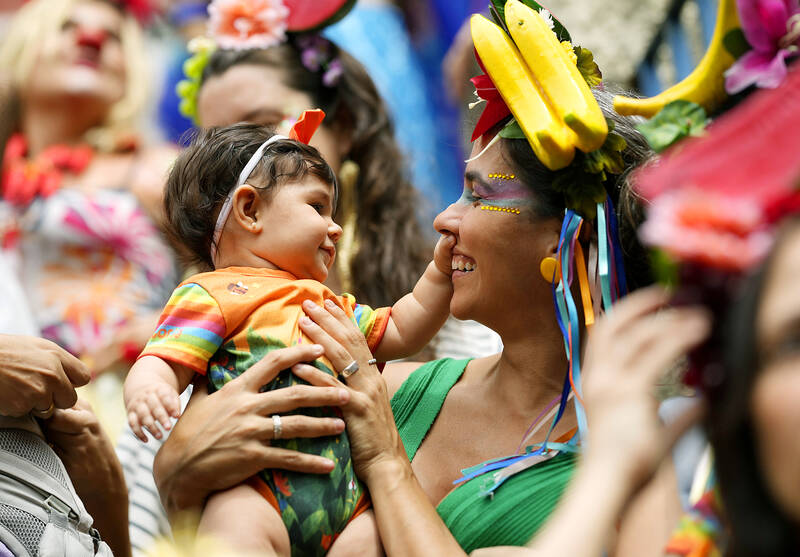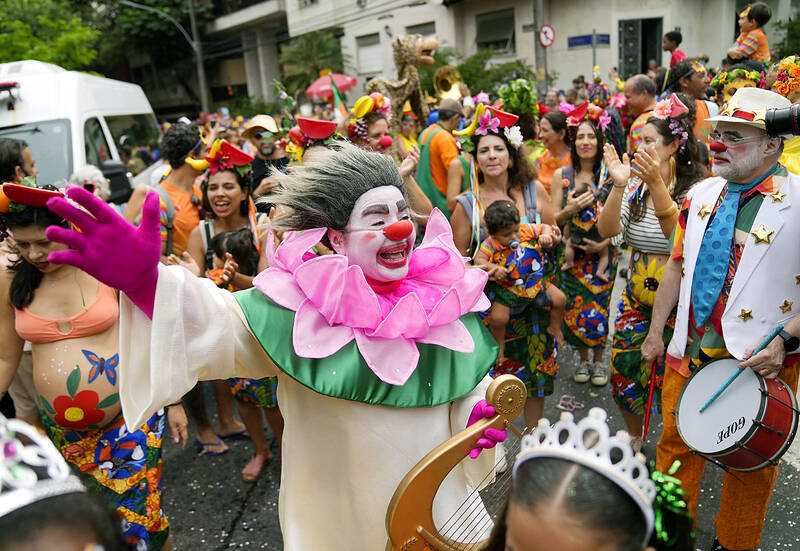Covered in golden glitter, Brazilian domestic worker Vera Lucia da Silva is bursting to be back parading through Rio de Janeiro in a carnival street party after a three-year hiatus amid COVID-19 restrictions.
This year marks the full comeback of the world’s biggest carnival, after Rio last year hosted a watered-down version that was postponed by two months because of the pandemic, and held without the epic street parties known as blocos that usually swarm the iconic beach city at this time of year.
“To people from Rio, street carnival is everything that’s good in life,” said Da Silva as she paraded through the hillside neighborhood of Santa Teresa in a bloco known as Ceu na Terra — “Heaven on Earth.”

Photo: AP
It was just after sunrise on a Saturday morning, but the beer was already flowing as revelers bounced to the beats of the bloco’s brass band, decked out in sequins, body paint, sparkly hot pants and masks — the costume-ball kind.
“Street carnival brings together people from all walks of life — everyone playing, everyone happy,” said Da Silva, 58, who plays a traditional percussion instrument known as the ganza in the bloco band.
Rio authorized about 400 blocos this year. They have been flooding the streets ahead of the main carnival event — the city’s samba school parade competition, scheduled for Sunday and Monday nights.

Photo: AP
Some revelers are also celebrating because it is the first carnival since the election loss of former Brazilian president Jair Bolsonaro, whose critics accuse him of attacking causes close to the carnival community’s heart.
Some revelers poked fun at the former army captain, whose slogan was: “Brazil above all, God above everyone.”
“We’re for ‘carnival atop all, booze inside everyone,’” said 44-year-old teacher Amelia Crespo, who was sporting the Brazil soccer team’s yellow jersey.
“This is a moment of rebirth,” said Pericles Monteiro, a founder of Ceu na Terra and conductor of its 200-member band.
“We went through a very dark period, in terms of both politics and the pandemic,” Monteiro told reporters.
“We were feeling suffocated on every level, as a cultural group, as citizens, as people dealing with a health crisis that caused so many deaths,” he said.
“Brazil is emerging from a period in which political power was anti-carnival,” said Adair Rocha, head of cultural programming at Rio de Janeiro State University. “This year’s carnival is all about happiness, the re-embrace of democracy, the freedom to celebrate cultural and sexual diversity... Carnival is all about democratic expression, the celebration of life.”
Brazilian President Luiz Inacio Lula da Silva, who narrowly beat Bolsonaro in the election in October last year, met with samba school leaders during the campaign and might attend the official carnival parades this year, media reports said.
Brazilian first lady Rosangela “Janja” da Silva has already signed up to be “godmother” at the Imperatriz samba school and support its social projects in Rio’s slums.
There is an optimistic vibe in the air at “Samba City,” the sprawling hangars where the samba schools prepare the towering floats and sumptuous costumes for their world-famous shows at the city’s Sambadrome parade venue.
“You can feel it: Culture is valued again,” said Tarcisio Zanon, creative director at the Viradouro samba school. “This is going to be a carnival of redemption, of hope for a better future.”
Rio officials are expecting 5 million people to take part in street carnival, moving an estimated 1 billion reais (US$190 million) for the local economy.
In the Saara market district, Rio’s mecca for sequins, wigs, glittery get-ups and all other things carnival, street vendors and shopkeepers are ready for the comeback.
“People have years of pent-up carnival energy,” vendor Marcelo Rodrigues said. “They’re ready to party.”

A new online voting system aimed at boosting turnout among the Philippines’ millions of overseas workers ahead of Monday’s mid-term elections has been marked by confusion and fears of disenfranchisement. Thousands of overseas Filipino workers have already cast their ballots in the race dominated by a bitter feud between President Ferdinand Marcos Jr and his impeached vice president, Sara Duterte. While official turnout figures are not yet publicly available, data from the Philippine Commission on Elections (COMELEC) showed that at least 134,000 of the 1.22 million registered overseas voters have signed up for the new online system, which opened on April 13. However,

EUROPEAN FUTURE? Albanian Prime Minister Edi Rama says only he could secure EU membership, but challenges remain in dealing with corruption and a brain drain Albanian Prime Minister Edi Rama seeks to win an unprecedented fourth term, pledging to finally take the country into the EU and turn it into a hot tourist destination with some help from the Trump family. The artist-turned-politician has been pitching Albania as a trendy coastal destination, which has helped to drive up tourism arrivals to a record 11 million last year. US President Donald Trump’s son-in-law, Jared Kushner, also joined in the rush, pledging to invest US$1.4 billion to turn a largely deserted island into a luxurious getaway. Rama is expected to win another term after yesterday’s vote. The vote would

ALLIES: Calling Putin his ‘old friend,’ Xi said Beijing stood alongside Russia ‘in the face of the international counter-current of unilateralism and hegemonic bullying’ Chinese President Xi Jinping (習近平) yesterday was in Moscow for a state visit ahead of the Kremlin’s grand Victory Day celebrations, as Ukraine accused Russia’s army of launching air strikes just hours into a supposed truce. More than 20 foreign leaders were in Russia to attend a vast military parade today marking 80 years since the defeat of Nazi Germany in World War II, taking place three years into Russia’s offensive in Ukraine. Putin ordered troops into Ukraine in February 2022 and has marshaled the memory of Soviet victory against Nazi Germany to justify his campaign and rally society behind the offensive,

CONFLICTING REPORTS: Beijing said it was ‘not familiar with the matter’ when asked if Chinese jets were used in the conflict, after Pakistan’s foreign minister said they were The Pakistan Army yesterday said it shot down 25 Indian drones, a day after the worst violence between the nuclear-armed rivals in two decades. Pakistani Prime Minister Shehbaz Sharif vowed to retaliate after India launched deadly missile strikes on Wednesday morning, escalating days of gunfire along their border. At least 45 deaths were reported from both sides following Wednesday’s violence, including children. Pakistan’s military said in a statement yesterday that it had “so far shot down 25 Israeli-made Harop drones” at multiple location across the country. “Last night, India showed another act of aggression by sending drones to multiple locations,” Pakistan military spokesman Ahmed